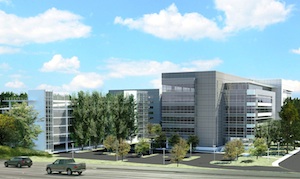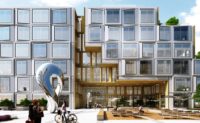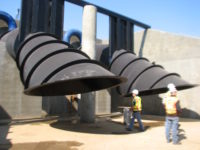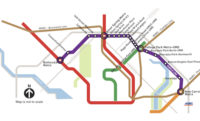As Silicon Valley grows its tenant portfolio of high-tech companies, local cities, developers and architects are preparing to meet the demand for more space and sustainable buildings. A case in point is the city of Mountain View, where San Francisco-based TMG Partners is constructing a $100-million build-to-suit research and development center for Samsung Information Systems America (SISA) Inc.

Last July, the city enacted a new general plan which allows for projects with a floor-area ratio of 1.0 to proceed if they meet certain criteria.
"You have to have a strong connection to transit, you have to be very sustainable and you have to have a lot of community benefits," says Ken Dupee, a partner with TMG. "We designed this project specifically to comply with those criteria and that's why it's been approved and we are going forward with it."
Designed by San Francisco-based Studios Architecture, the 385,000-sq-ft project includes two, six-story research and development buildings and two, five-story parking structures with 550 spaces each. The new 8.9-acre campus, to be built by Milpitas-based Devcon Construction, takes the place of four 1970s structures and is scheduled to break ground this summer.
David Sabalvaro, a principal with Studios Architecture, says this represents a new generation of developer-based projects, where instead of putting up "the simplest buildings they can, and then leasing them," TMG is trying to specifically address Mountain View's planning concepts.
He says this project is the first "high-density" building the city is allowing under its new general plan.
"This is two to three times more dense than previously approved projects in Mountain View," says Sabalvaro, who is also principal in charge of the Samsung campus. "It is taller, has less footprint and you can get more people on the site."
But higher density also comes with downsides, like more commuting and traffic around the project, Sabalvaro says. This is where sustainable features come into play.
The campus, which is shooting for LEED Platinum, will utilize sustainable features such as natural daylighting, sunshading, photovoltaic panels, high-efficient glass and a 5-zone thermodynamic heating and cooling system that reduces and eliminates reheat energy and increases system efficiency.
The project also offsets 41% of its site for park-like open spaces, is within 2,000 ft of light rail, will offer bicycle storage and changing rooms and will create a new shuttle system to and from the campus to Downtown Mountain View and the local Caltrain Station.
"There are a number of companies in Mountain View that provide shuttles to the train, but we are taking it one step further and as part of our community benefit, we are going to form a transportation management agency, which is a non-profit public benefit corporation," Dupee says.
Scheduled to complete at the end of 2014, the project is on an aggressive schedule to meet Samsung's move-in date.
"We've had to do things quite quickly," Dupee says. "We went from a letter-of-intent last spring to a finished design, with full EIR, all the approvals, and 7-0 votes in the planning commission and in City Council supporting the project, all in just 13 months."





Post a comment to this article
Report Abusive Comment